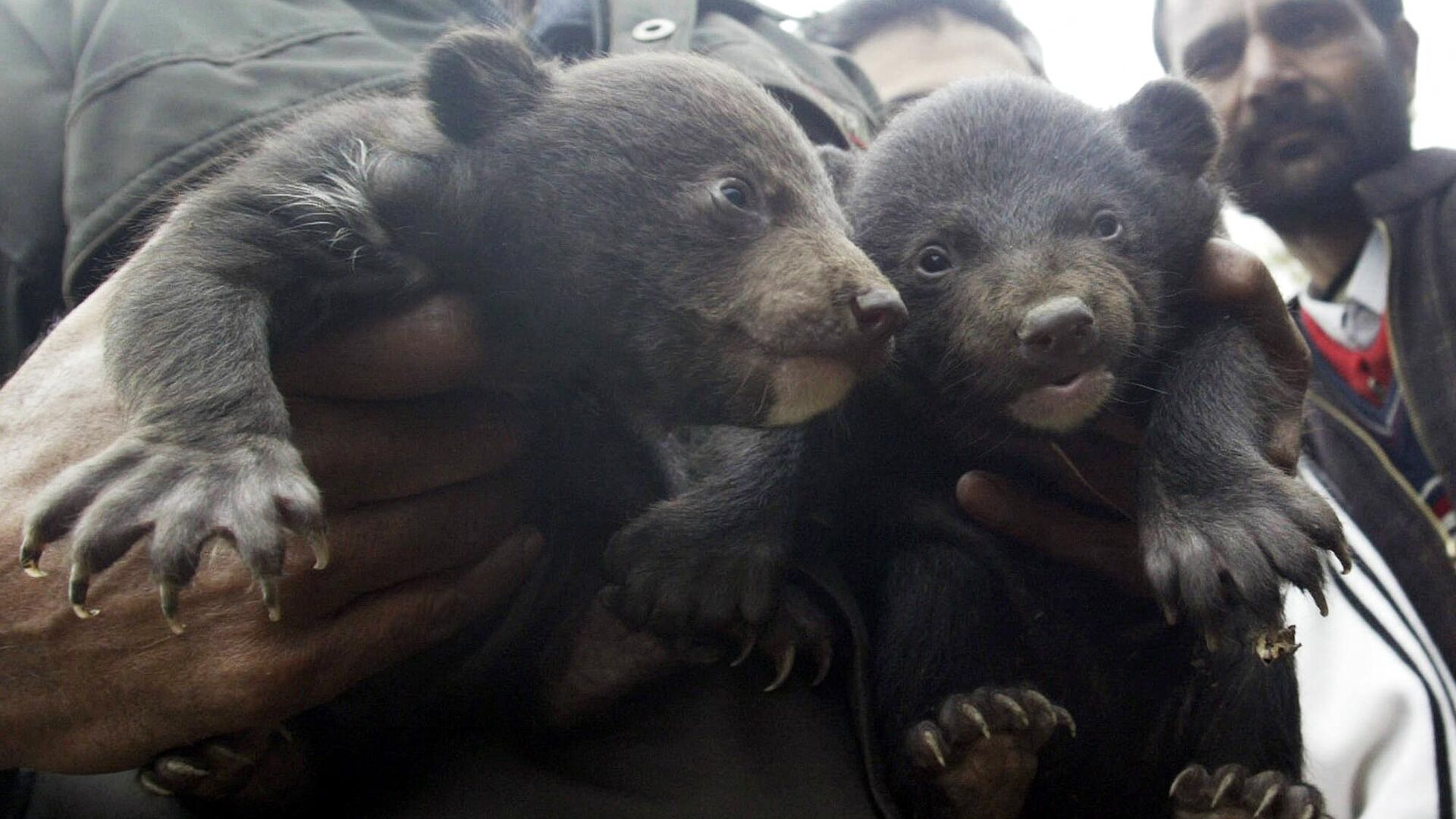https://sputniknews.in/20230116/urbanization-climate-change--garbage-what-ails-kashmirs-brown-bears-513373.html
Urbanization, Climate Change & Garbage: What Ails Kashmir's Brown Bears
Urbanization, Climate Change & Garbage: What Ails Kashmir's Brown Bears
Sputnik India
The Kashmir region seems to be faltering in providing to a safe biological corridor to the Himalayan brown bear in the face of climate change and rapid urbanization making the breed vulnerable.
2023-01-16T19:16+0530
2023-01-16T19:16+0530
2023-01-16T19:16+0530
wildlife
jammu and kashmir (j&k)
india
climate change
sputnik exclusives
the himalayas
environment
urbanization
bears
https://cdn1.img.sputniknews.in/img/07e7/01/10/518977_0:178:2000:1303_1920x0_80_0_0_f056afc40ac4d8b734fa37fb402a3ca5.jpg
Concerns are rising over the future of the Himalayan brown bear in Kashmir as the region is criticized of failing to provide a safe biological corridor in the face of climate change and rapid urbanization.The species is currently valued as being vulnerable to extinction, already figuring in the International Union for Conservation of Nature (IUCN) Red List of threatened species.Brown bears feeding on garbage - a result of urbanization and a government plan to increase tourist inflow into Kashmir - is, however, only one of the threats the species faces.Global warming, developmental activities, tourism, religious pilgrimages, human-animal conflict, rapid habitat loss, retaliatory killings, and poaching for fur, claws and organs are other factors mentioned in the study.Where Do Himalayan Brown Bears Live?The Himalayan bear, a subspecies of the brown bear prominently found in Russia and North America, is a key wildlife feature of countries including China, India, Pakistan, Afghanistan and Nepal.In India, the bears are largely confined to the north-western and western Himalayan ranges in Jammu and Kashmir and the northern states of Himachal Pradesh and Uttarakhand. They are poorly studied due to their elusive nature and distribution across rugged landscape.Garbage is Major EnemyA first-of-its-kind study conducted by Wildlife SOS, a non-profit Indian conservation organization, and Jammu and Kashmir's wildlife protection department, hasn’t exactly painted a positive picture of the species' future.This is despite the fact that brown bears, according to the study, are opportunistic omnivores: their diets consist of fruit, other plant materials, and animal items such as mammals, fishes and insects.Out of 408 scat analyses, 86 were found to have plastic bags, milk powder and chocolate covers in their diets.Garbage items were found in the scats in all four months studied, with the lowest results appearing in October, possibly due to the lower numbers of tourists in that month, the study stated.The research team also heavily relied on camera trappings between July 8 and Octover 28, 2021.Adverse Impact of TourismProject Manager and Education Officer at Wildlife SOS Aaliya Mir, who was part of the eight-member research team, said that hotels being built in the midst of dense forests in Kashmir’s top tourist destinations Sonmarg and Gulmarg are causing irreparable damage to the ecology of the region.Tourism in Kashmir took a massive hit after the eruption of anti-India militancy in the late 80s and continued to suffer as violence increased through the years.However consecutive governments in New Delhi have prioritized promoting tourism in the region in a bid to showcase the return of normalcy in Kashmir.As a result, hundreds of hotels have been built in recent years and many are located in ecologically-sensitive forest areas.Wildlife SOS and the wildlife protection department also made some recommendations for the Jammu and Kashmir administration to protect wildlife in the region. These include limiting tourist and pilgrim inflow, creating buffer zones, banning plastic, keeping hotel activity in check and establishing effective garbage dumping facilities.Nobody is a Winner, But Everyone a VictimAnother aspect highlighted by Mir is the human-animal conflict, which comes amid unchecked urbanization and a lack of prioritizing saving wildlife.Mir stated that despite the organizations' efforts to spread awareness in order to reduce human-animal conflict, more and more humans settling into habitats of wildlife is bound to create fatal tussles.She concluded that there are no winners in this situation, only victims."Protecting wildlife is protecting ourselves too and the authorities as well as people should understand this before it's too late,” Mir remarked.
https://sputniknews.in/20230109/rare-white-himalayan-griffon-vulture-rescued-in-indias-uttar-pradesh-422967.html
jammu and kashmir (j&k)
india
the himalayas
Sputnik India
feedback.hindi@sputniknews.com
+74956456601
MIA „Rossiya Segodnya“
2023
Azaan Javaid
https://cdn1.img.sputniknews.in/img/07e6/0c/08/19280_0:0:1080:1080_100x100_80_0_0_d0f3f10ac6f30fb5b9e5e21a5e2536ea.jpg
Azaan Javaid
https://cdn1.img.sputniknews.in/img/07e6/0c/08/19280_0:0:1080:1080_100x100_80_0_0_d0f3f10ac6f30fb5b9e5e21a5e2536ea.jpg
News
en_IN
Sputnik India
feedback.hindi@sputniknews.com
+74956456601
MIA „Rossiya Segodnya“
Sputnik India
feedback.hindi@sputniknews.com
+74956456601
MIA „Rossiya Segodnya“
Azaan Javaid
https://cdn1.img.sputniknews.in/img/07e6/0c/08/19280_0:0:1080:1080_100x100_80_0_0_d0f3f10ac6f30fb5b9e5e21a5e2536ea.jpg
wildlife protection, himalayan brown bear, kashmir tourism, tourism in india, climate change, study on kashmir brown bear, himalayan brown bear population, kashmir bears,
wildlife protection, himalayan brown bear, kashmir tourism, tourism in india, climate change, study on kashmir brown bear, himalayan brown bear population, kashmir bears,
Urbanization, Climate Change & Garbage: What Ails Kashmir's Brown Bears
Despite brown bears being classified as a “least concern” species owing to their huge numbers in Russia, the Himalayan subspecies may be in danger.
Concerns are rising over the future of the Himalayan brown bear in Kashmir as the region is criticized of failing to provide a safe biological corridor in the face of climate change and rapid urbanization.
The species is currently valued as being vulnerable to extinction, already figuring in the International Union for Conservation of Nature (IUCN) Red List of threatened species.
A joint study by a non-governmental organization and the Jammu and Kashmir administration has revealed that the Kashmiri brown bears, considered an apex predator, are feeding on toxic food waste released by hotels in one of South Asia’s top tourist destinations.
Brown bears feeding on garbage - a result of urbanization and a government plan to increase tourist inflow into Kashmir - is, however, only one of the threats the species faces.
Global warming, developmental activities, tourism, religious pilgrimages, human-animal conflict, rapid habitat loss, retaliatory killings, and poaching for fur, claws and organs are other factors mentioned in the study.
Where Do Himalayan Brown Bears Live?
The Himalayan bear, a subspecies of the brown bear prominently found in Russia and North America, is a key wildlife feature of countries including China, India, Pakistan, Afghanistan and Nepal.
In India, the bears are largely confined to the north-western and western Himalayan ranges in Jammu and Kashmir and the northern states of Himachal Pradesh and Uttarakhand. They are poorly studied due to their elusive nature and distribution across rugged landscape.
A first-of-its-kind study conducted by Wildlife SOS, a non-profit Indian conservation organization, and Jammu and Kashmir's wildlife protection department, hasn’t exactly painted a positive picture of the species' future.
According to the study titled “Himalayan Brown Bear Ecological and Human-Bear Conflict Investigation in Kashmir with Special Reference to Bear Habituation to Garbage Dumps In The Central Wildlife Division," the diet composition of the species based on scat analysis revealed 75% of food items consumed were scavenged from garbage.
This is despite the fact that brown bears, according to the study, are opportunistic omnivores: their diets consist of fruit, other plant materials, and animal items such as mammals, fishes and insects.
Out of 408 scat analyses, 86 were found to have plastic bags, milk powder and chocolate covers in their diets.
Garbage items were found in the scats in all four months studied, with the lowest results appearing in October, possibly due to the lower numbers of tourists in that month, the study stated.
The research team also heavily relied on camera trappings between July 8 and Octover 28, 2021.
Data gathered from hundreds of camera traps showed that 62% captured sequences of brown bears foraging for food at garbage dumps.
Adverse Impact of Tourism
Project Manager and Education Officer at Wildlife SOS Aaliya Mir, who was part of the eight-member research team, said that hotels being built in the midst of dense forests in Kashmir’s top tourist destinations Sonmarg and Gulmarg are causing irreparable damage to the ecology of the region.
The study also mentioned that religious pilgrimages undertaken each year end up in the accumulation of massive amounts of garbage in the sensitive wildlife corridors.
Tourism in Kashmir took a massive hit after the eruption of anti-India militancy in the late 80s and continued to suffer as violence increased through the years.
However consecutive governments in New Delhi have prioritized promoting tourism in the region in a bid to showcase the return of normalcy in Kashmir.
As a result, hundreds of hotels have been built in recent years and many are located in ecologically-sensitive forest areas.
“These garbage dumps were prone to attracting and serving as easy food for the wildlife. Bear scavenging in the garbage dumps could be attributed to proximate factors like food availability, palatability, habitat degradation and ultimate factors like nutrient requirements and an increase in body mass. Further, the expansion of tourism activities and holy pilgrimage lead to habitat fragmentation and destruction,” the study informed.
Wildlife SOS and the wildlife protection department also made some recommendations for the Jammu and Kashmir administration to protect wildlife in the region. These include limiting tourist and pilgrim inflow, creating buffer zones, banning plastic, keeping hotel activity in check and establishing effective garbage dumping facilities.
Nobody is a Winner, But Everyone a Victim
Another aspect highlighted by Mir is the human-animal conflict, which comes amid unchecked urbanization and a lack of prioritizing saving wildlife.
Mir stated that despite the organizations' efforts to spread awareness in order to reduce human-animal conflict, more and more humans settling into habitats of wildlife is bound to create fatal tussles.
"Not only does this make humans vulnerable, especially children, the animals themselves face violent ends."
She concluded that there are no winners in this situation, only victims.
"Protecting wildlife is protecting ourselves too and the authorities as well as people should understand this before it's too late,” Mir remarked.



